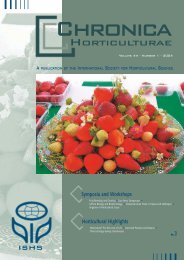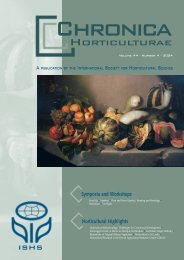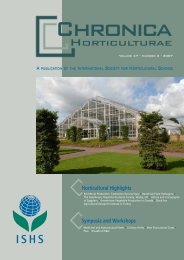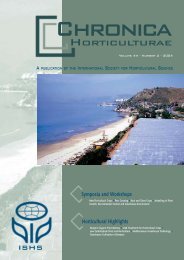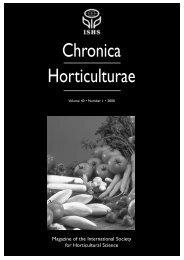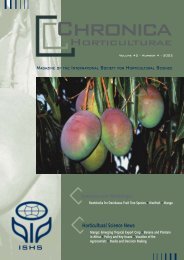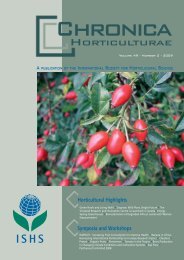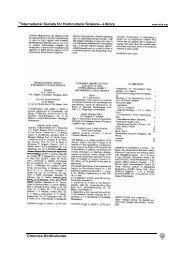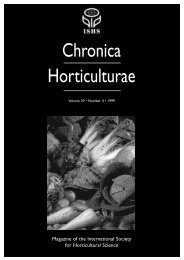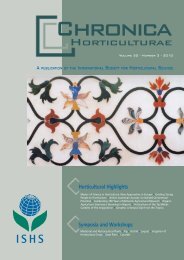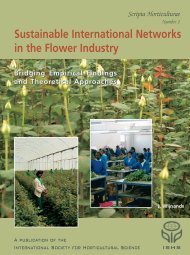The World Foliage Plant Industry - Acta Horticulturae
The World Foliage Plant Industry - Acta Horticulturae
The World Foliage Plant Industry - Acta Horticulturae
Create successful ePaper yourself
Turn your PDF publications into a flip-book with our unique Google optimized e-Paper software.
A Call for Nominations: ISHS Honorary<br />
Membership and Fellowship<br />
Nominations for new Honorary Members and Fellows of the ISHS will be considered by<br />
the Council at its meeting in Korea next year. Any nomination for this should be received<br />
at the Secretariat not later than April 15th, 2006, for consideration by the ISHS<br />
Nomination and Award Committee and the ISHS Board prior to the meeting of the<br />
Council.<br />
ISHS HONORARY<br />
MEMBERSHIP<br />
Honorary Membership, the Emeritus Award of<br />
the ISHS, is given by the Council to a person<br />
who is a member of the ISHS, at the end of<br />
his/her career, in recognition of his/her outstanding<br />
service to the Society. A certificate will be<br />
given to the recipients of this ISHS Award.<br />
ISHS FELLOWSHIP<br />
<strong>The</strong> ISHS Fellowship is presented to any person,<br />
regardless of his/her age, ISHS member or nonmember,<br />
in recognition of this person’s out-<br />
standing contribution to horticultural science<br />
worldwide and/or for his/her meritorious service<br />
on behalf of the Society. A precious metal<br />
pin and a certificate is given to the recipients of<br />
this ISHS award. <strong>The</strong> total number of ISHS<br />
Fellows should not exceed 1% of the total<br />
membership, averaged over a period of 4 years.<br />
PROCEDURE<br />
<strong>The</strong> ISHS Nominations and Awards Committee<br />
(hereafter: ‘<strong>The</strong> Committee’) invites the members<br />
of the Society, through this announcement<br />
in Chronica <strong>Horticulturae</strong>, to bring possible<br />
candidates for an ISHS Honorary Membership<br />
and Fellowship to the attention of the Society.<br />
Nominations should be accompanied by five<br />
letters of support, giving reasons why a nominee<br />
is considered worthy of an honour; these<br />
letters must come from members in no less<br />
than three different countries. Nominations<br />
must be received by the Executive Director at<br />
least three months prior to the Council meeting.<br />
<strong>The</strong> Executive Director will collect the suggestions<br />
and will send these, together with the<br />
letters of support, to ‘<strong>The</strong> Committee’. After<br />
consideration by ‘<strong>The</strong> Committee’ and the ISHS<br />
Board, the suggestions received and motivated<br />
recommendions will be presented to the<br />
Council, which will decide who will receive the<br />
Awards. <strong>The</strong> presentation ceremony will take<br />
place at the next Congress (IHC2006 Seoul,<br />
Korea) during the General Assembly of the<br />
ISHS.<br />
ISSUES<br />
<strong>The</strong> Challenge of Distance Learning in<br />
Horticulture<br />
Geoffrey R. Dixon<br />
Education in any discipline and at any level of<br />
attainment should increase the student’s<br />
powers of understanding, deduction, integration<br />
and prediction based on an enhanced<br />
store of knowledge. It should not be the accumulation<br />
and regurgitation of information that<br />
is readily available in reference books and the<br />
<strong>World</strong>-Wide-Web. Learning how to use information<br />
to build knowledge and scholarship in<br />
an integrative manner is the essence of an<br />
effective education.<br />
Most systems of education are dependent on<br />
public tax raised finance to a greater or lesser<br />
extent. As a consequence, political priorities for<br />
simplification (modularisation or unitisation),<br />
mass delivery, increased speed, reduced cost,<br />
and provision for career changes have become<br />
dominating and driving forces in the formulation<br />
of public education. <strong>The</strong>se processes are<br />
frequently clothed in the framework of the<br />
“market economy” and encapsulated in terms<br />
such as “value for money,” “satisfying customer<br />
demands,” “achieving client satisfaction”<br />
and “student-centred learning.” <strong>The</strong> underlying<br />
logic of pedagogical arguments that shift education<br />
towards learning as opposed to teaching<br />
have much to recommend them. This shift<br />
does, however, require greater provision of<br />
human and physical resources if it is to improve<br />
education and this adds to the overall costs of<br />
education. Without such increased financial<br />
investment the student-centred learning<br />
approach levels down education and erodes<br />
scholarship.<br />
Some educationists and more particularly policy<br />
makers and politicians see electronic delivery at<br />
a distance as one route towards student-centred<br />
learning as opposed to teaching-centred<br />
learning that avoids the penalty of increasing<br />
costs. Experience shows that the reverse is true<br />
and that good quality, effective distance learning<br />
provided by electronic delivery demands<br />
an investment in teaching staff and resources<br />
that is at least on a par with face-to-face learning.<br />
This article considers the particular requirements<br />
for an education in horticulture and<br />
how these may be satisfied by electronic distance<br />
delivery using examples from leading centres<br />
of excellence.<br />
WHAT IS EDUCATION IN<br />
HORTICULTURE?<br />
Traditionally education in horticulture has integrated<br />
the relevant arts, sciences, humanities<br />
and husbandries into students’ knowledge<br />
bases that allowed entry into widely differing<br />
careers with a considerable span of responsibilities<br />
(Dixon, 2005). Essentially this is not radically<br />
different to the education offered to engineers<br />
or architects.<br />
Face-to-face education in each of these disciplines<br />
demanded the availability of a large tea-<br />
CHRONICA HORTICULTURAE •VOL 45 • NUMBER 4 • 2005 • 5



